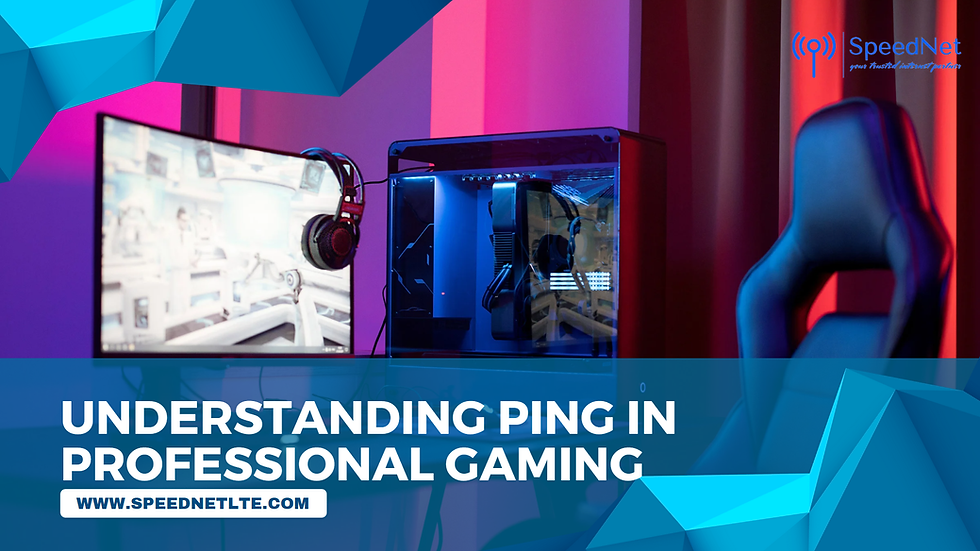Understanding Ping in Professional Gaming
- Arnim Sharma
- Oct 18, 2024
- 4 min read
Table of Contents
What is Ping in Professional Gaming?
What is a Good Ping Speed?
Impacts of Ping in Gaming
Does Ping Impact Professional Gaming?
FAQs
Conclusion
What is Ping in Professional Gaming?
Ping is a term commonly used in online gaming to describe the latency or delay between a player’s device and the game server. Specifically, it measures the time it takes for a data packet to travel from the player’s computer to the server and back again.
This measurement is typically expressed in milliseconds (ms). A lower ping indicates a more responsive connection, which is crucial for competitive gaming where split-second decisions can mean the difference between victory and defeat.
What is Ping Explained?
Ping originated from a network utility used to test the reachability of a host on a network. In gaming, it refers to the responsiveness of the connection to the game server. Players often use tools and in-game settings to monitor their ping, aiming for the lowest possible latency to ensure smooth gameplay.
What is a Ping in Gaming?
In gaming, ping can be influenced by various factors including the player’s internet connection, the distance to the game server, and network traffic. A ping measurement can significantly impact how players experience the game, particularly in fast-paced genres like first-person shooters or real-time strategy games.
What is a Good Ping Speed?
A good ping speed can vary depending on the type of game and the player’s expectations. Generally, the following thresholds are considered:
0-20 ms: Excellent ping. Almost no noticeable lag.
20-50 ms: Good ping. Generally suitable for most online games.
50-100 ms: Average ping. Playable but may experience slight lag.
100-200 ms: Poor ping. Noticeable lag may affect gameplay.
200+ ms: Unplayable. Severe lag that can ruin the gaming experience.
What is a Good Ping Speed for Streaming?
For online streaming, a ping speed of 20-50 ms is ideal. While ping is less critical for streaming compared to download and upload speeds, lower ping can enhance the overall experience by reducing buffering and latency in real-time interactions, especially during live gaming streams.
Apps That Help Reduce Ping for Gaming
In the quest for a smoother online gaming experience, various applications have emerged to assist players in reducing ping and enhancing connectivity. One notable example is ExitLag, which optimizes network routes and minimizes latency through advanced algorithms, directing your connection through the fastest available pathways.
Other popular options include Haste and WTFast, both of which work similarly by improving packet delivery and reducing lag spikes. These tools are particularly beneficial for gamers who frequently experience high ping due to geographical distance from game servers or network congestion. By utilizing such applications, players can enjoy a more responsive gaming experience, ultimately giving them a competitive edge in multiplayer scenarios.
Impacts of Ping in Gaming
The impact of ping in gaming can be profound. Here are some key effects:
Gameplay Responsiveness: High ping can lead to delayed actions, making it difficult to respond quickly to in-game events.
Hit Registration: In competitive shooting games, high ping can cause issues with hit registration, where shots may not register accurately due to latency.
Matchmaking: Many games match players based on ping to ensure a fair experience. Players with high ping may find themselves matched with others who have better connections, leading to an uneven playing field.
Frustration: Players may experience increased frustration with high ping, leading to a negative gaming experience and impacting performance.
Does Ping Impact Professional Gaming?
In professional gaming, ping is a critical factor that can determine the outcome of matches. Professional players rely on precise timing and quick reflexes, making low ping a necessity for success. Tournaments often require players to compete on servers located in proximity to ensure fair conditions.
High ping can hinder a player's ability to perform optimally, affecting everything from aiming accuracy to movement responsiveness. Many professional gamers invest in high-speed internet connections and optimize their setup to minimize ping, underscoring its importance in the competitive scene.
Conclusion
Understanding ping and its implications in gaming is essential for anyone looking to improve their online gaming experience, whether casually or professionally. With lower ping speeds leading to better performance, players should strive for optimal connections to enhance their gameplay. By being aware of how ping impacts gaming, players can make informed decisions about their setups and strategies, ultimately contributing to a more enjoyable gaming experience.

FAQs
What is the best way to lower ping in gaming?
To lower ping, consider using a wired connection instead of Wi-Fi, choosing game servers closer to your location, closing background applications that use bandwidth, and ensuring your internet speed meets the game's requirements.
How can I check my ping?
You can check your ping using various tools and websites, such as "pingtest.net" or within the game itself. Most modern games display ping in the settings or during gameplay.
Can a VPN help with ping issues?
A VPN can sometimes help by routing your connection through faster servers. However, it can also increase ping if the VPN server is far away. It's best to test different configurations.
Does ping affect single-player games?
Ping typically does not affect single-player games as there is no server connection involved. However, it can impact features like online leaderboards or downloadable content.










コメント